
Introduction
The age of digital marketing has evolved beyond TV advertisements and billboards. Companies are quickly shifting their efforts to digital marketing, an umbrella word that refers to every online effort aimed at advertising products, services, and brands. From ads on social media to SEO or search engine optimization (SEO), Digital marketing is a low-cost and precise method of reaching prospective clients.
With more and more people spending time on the Internet, companies must establish a digital strategy to remain in the race. This blog provides an extensive overview of the field of the digital world, breaking down the essential components, tools, and techniques. Whether you’re a veteran marketing professional or an entrepreneur new to digital marketing, this article will arm you with the necessary knowledge to create and implement an effective strategy for digital marketing.
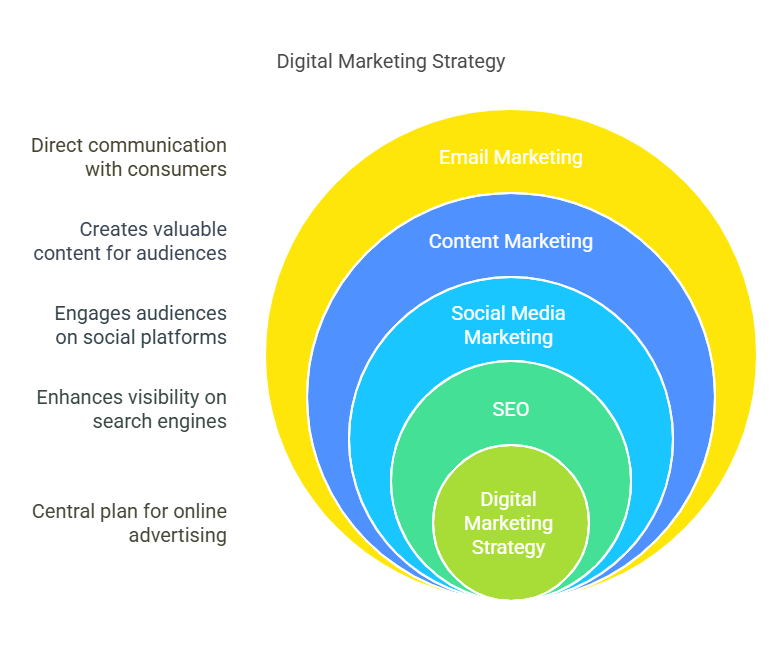
What is Digital Marketing?
Digital marketing is the term used to describe the entire range of marketing strategies that utilize technology like the Internet or electronic devices to connect with and entertain viewers. In contrast to traditional marketing, which is based on channels such as television, print advertisements, or radio, digital marketing concentrates on digital platforms like social media sites, websites, emails, and search engines.
The significant difference between digital and traditional marketing is the degree of accuracy. Digital marketing lets companies concentrate on certain segments of their customers by sending specific messages, making the process more economical and easily quantifiable. Furthermore, digital advertising can be improved in real-time in response to the performance so that companies can adjust their strategies swiftly.
Advantages of Digital Marketing
-
Cost-efficiency lowers costs when compared to traditional channels for advertising.
-
Targeted Reach A means targeting specific audiences by analyzing factors such as a person’s age, location, interests, and online behaviour.
-
Results that can be measured in real time allow marketers to measure the impact of their advertising campaigns.
-
Reach across the globe businesses can reach an audience across the world with ease.
-
Interactivity Interacting with your customers on social media through comments and feedback builds the relationship between the business and its target audience.
-
Key Components of Digital Marketing
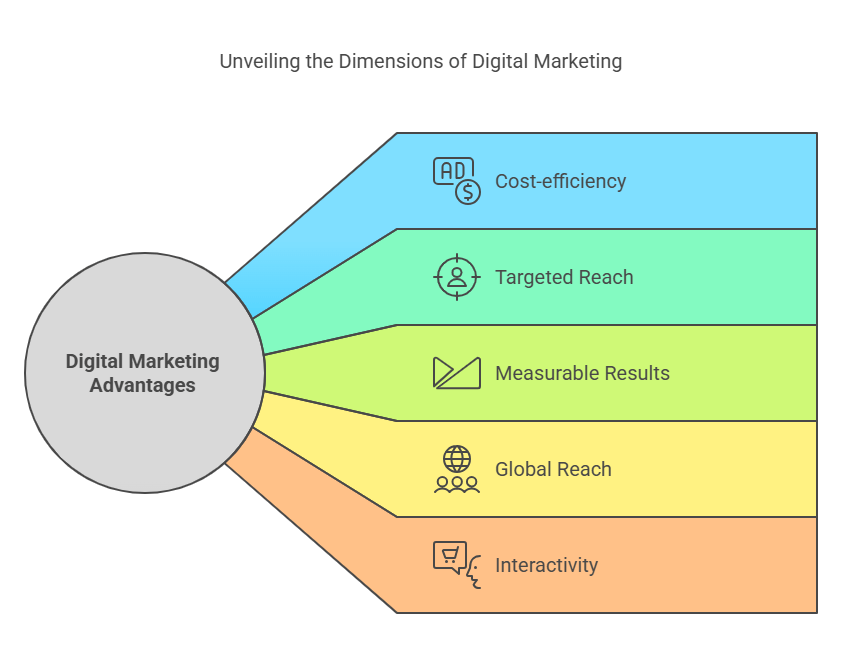
Search Engine Optimization (SEO)
SEO is the process that helps your website get higher rankings on the search results pages (SERPs). A highly ranked site will attract organic (non-paid) visitors, which results in increased exposure and the possibility of results in conversions.
Strategies for SEO that are essential comprise:
-
SEO On-Page is focused on optimizing the content and HTML source code of a webpage (keywords and meta tag headlines).
-
Off-page SEO involves the creation of quality backlinks on reputable sites for increased credibility.
-
Technical SEO ensures that the site is optimized for search engines from a technical perspective, including improving its performance and mobile-friendliness.
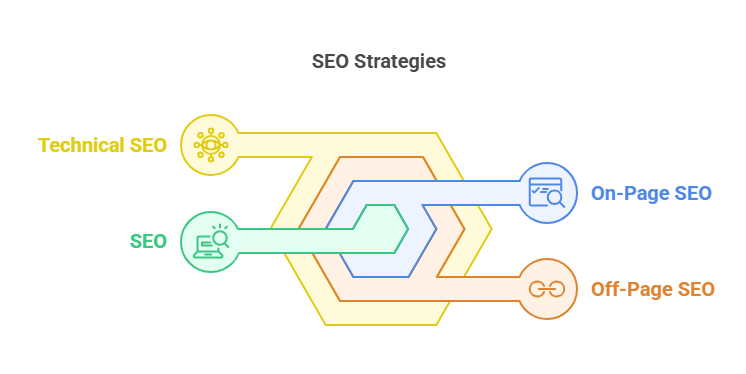
Content Marketing
Content marketing is about making and sharing valuable, pertinent, consistent, and relevant information to create and keep the attention of a defined target audience. Instead of selling your goods using content marketing, you can establish customer confidence by offering helpful content.
The most popular types of content are:
-
Blogs
-
Videos
-
Infographics
-
E-books
-
Podcasts
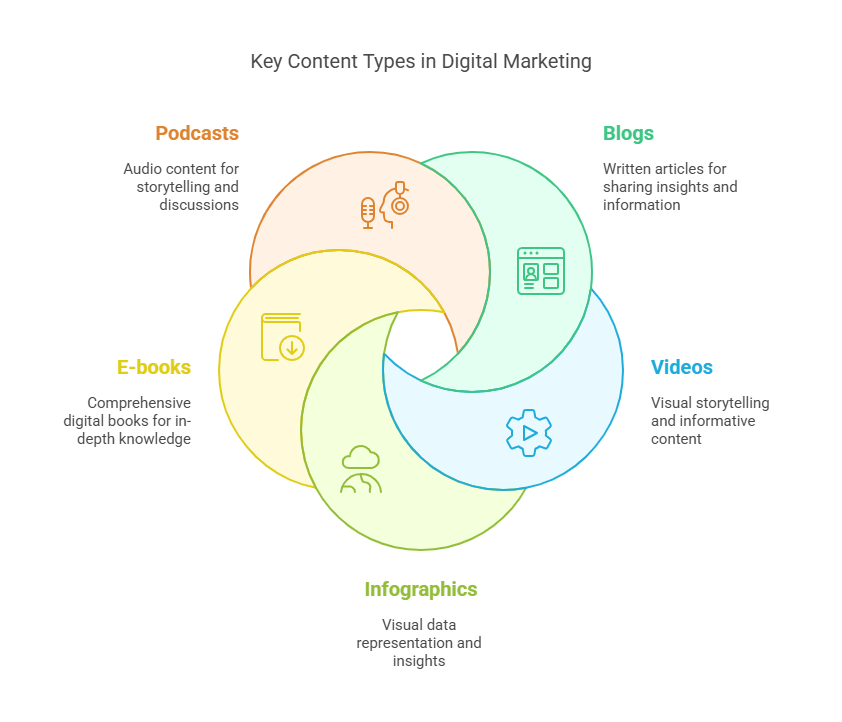
Social Media Marketing
Social media marketing uses platforms such as Facebook, Instagram, Twitter, and LinkedIn to promote your company and connect with your target audience. Each platform has its own user base and interaction style, and it’s crucial to create content that is tailored for each platform.
The best practices are:
-
Sharing regularly and posting relevant sharing material
-
Engaging followers via comments as well as likes and explicit messages
-
Ad campaigns that are targeted for a more significant impact
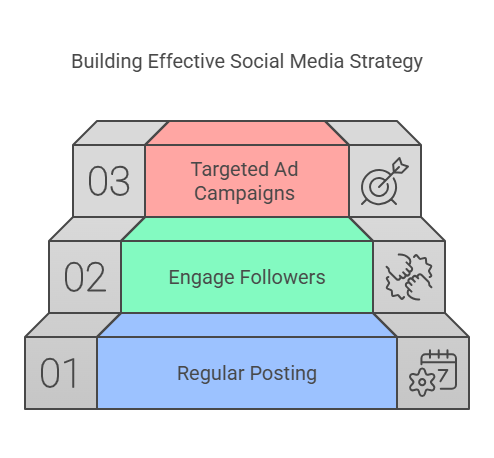
Pay-Per-Click (PPC) Advertising
PPC advertising permits businesses to place ads on Google’s sponsored links whenever someone searches for keywords related to their products. Google Ads and social media advertising (e.g., Facebook Ads) are well-known platforms for running PPC campaigns.
The advantage of PPC is that it produces immediate results. Once the ad has been placed, you can see it begin generating visitors and converts in minutes.
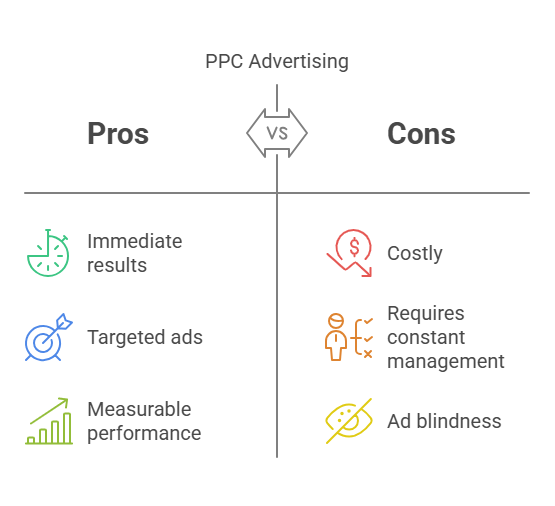
Email Marketing
Email marketing is one of the most efficient digital channels for nurturing leads and driving sales. It involves sending targeted emails to a targeted group of customers with customized messages, offers, and valuable content.
Effective email marketing strategies consist of the following:
-
A high-quality list of email addresses
-
Sending personalized emails based on user behaviour and personal preferences
-
Automating email sequences for efficient communications
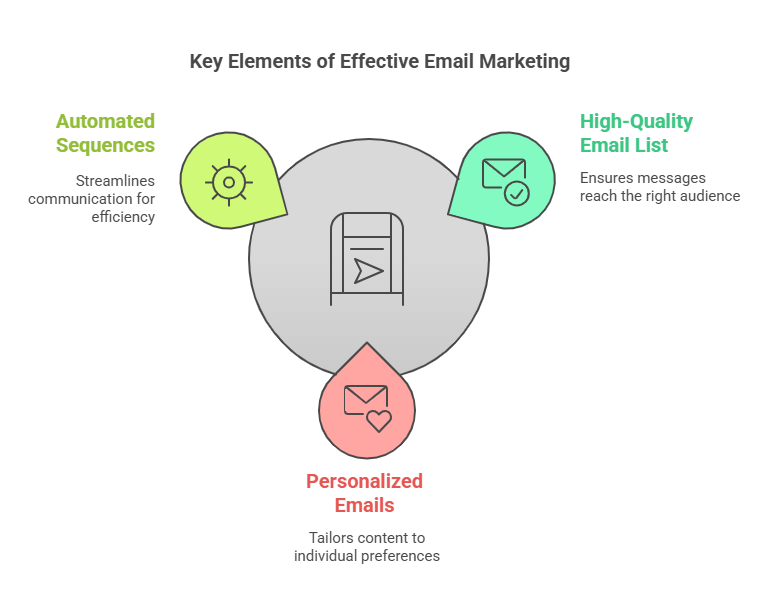
Affiliate Marketing
It is a performance-based approach in which companies reward affiliates (partners) for generating sales or traffic with their referrals. Affiliates advertise your goods via their websites and, in exchange, receive a percentage of each purchase.
Although affiliate marketing may increase branding and sales, it’s important to choose an affiliate partner who shares your brand’s values.
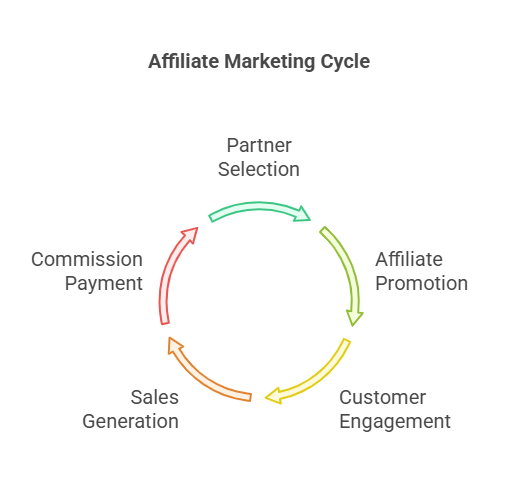
Influencer Marketing
Through influencer marketing, organizations work with influencers (people who have a loyal social network) to market their goods. Influencers serve as trustworthy voices in specific areas, which makes this approach highly efficient in generating branding awareness and trust among consumers.
It is crucial to select the best influencers to work with. Those who align with your values and have an authentic connection to their followers will increase participation.
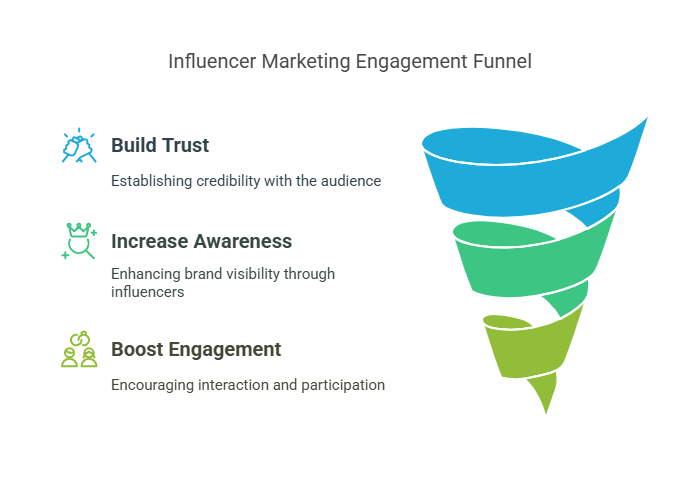
Tools for Digital Marketing
SEO tools Tools like Google Analytics, SEMrush, and Ahrefs assist businesses in tracking and enhancing their rankings in search engines. They provide insights on search engine performance, backlink profile information, and competitor analysis.
Social Media Management Tools Platforms such as Hootsuite and Buffer make it easier to schedule social media events and manage content across various platforms.
Tool for Marketing Emails: Mailchimp, Constant Contact, and ConvertKit allow businesses to automate their email marketing campaigns, create sort lists, and evaluate the results of these campaigns.
PPC Tool: Google Ads and Facebook Ads Manager are critical platforms for running PPC campaigns and monitoring performance metrics such as conversion and click-through rates.
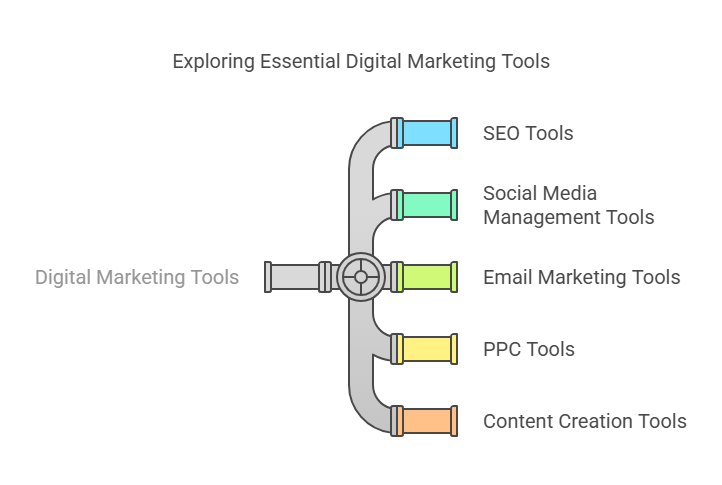
Content Creator Tool: Canva is one of the most popular tools for creating engaging graphics. Grammarly assists in polishing written content to ensure it’s error-free and professional.
-
Best Practices for a Successful Digital Marketing Strategy
-
Establish clear goals and create measurable objectives, such as improving traffic, increasing participation, or driving more conversions.
-
Get to Know Your Audience Understanding your people’s demographics, interests, and online behaviour can create more targeted and efficient marketing campaigns.
-
Consistent branding: To form a coherent branding identity, Make sure your message, visuals, and tone are uniform across different platforms.
-
You regularly Monitor and Optimize the results of your marketing campaigns and prepare changes as necessary to improve the results.
-
Measuring Success in Digital Marketing
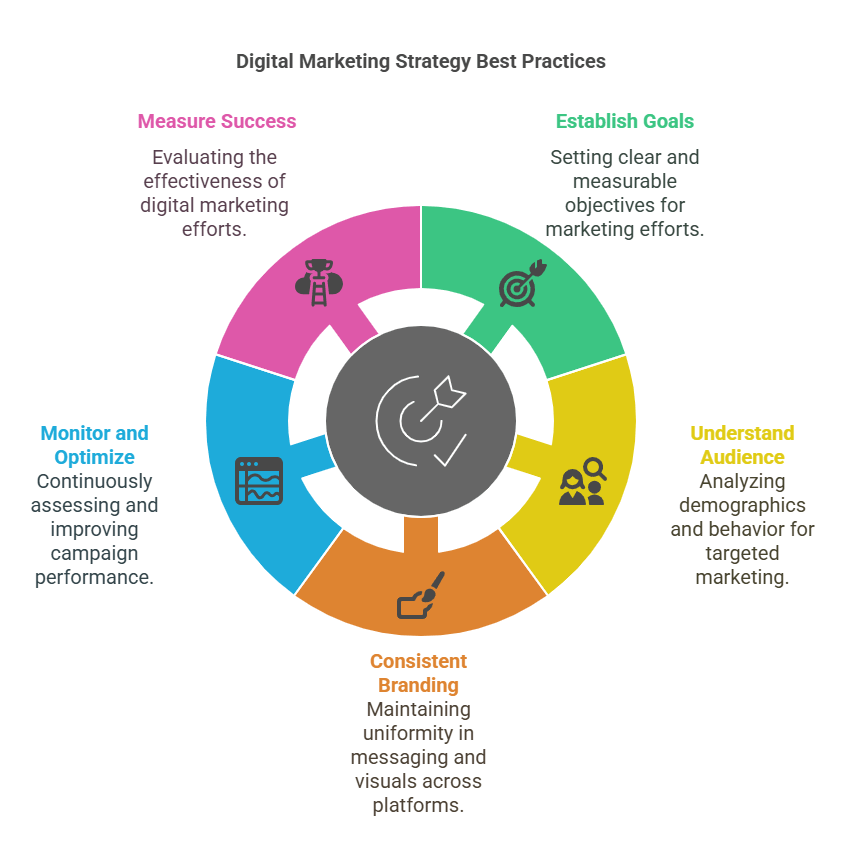
To determine the efficacy of your online marketing campaigns, concentrate on these crucial measures:
-
Traffic to your website: How many people visit your website, and through which sources?
-
Engagement: are users engaging with your post, leaving comments and sharing content?
-
Conversions: What percentage of visitors take the action they want, like purchasing something or signing up for an email newsletter?
-
ROI: Are your digital marketing campaigns delivering a return on investment? Make use of analytics tools to assess the ROI.
-
Future Trends in Digital Marketing
-
Artificial Intelligence and Automatization Automation and HTML0: The application of artificial intelligence for marketing automation is increasing, helping businesses create effective and more customized campaigns.
-
Voice search: With smartphones’ increasing popularity, voice search is becoming more vital, impacting how SEO strategies are formulated.
-
Video content, especially short-form videos like those posted on TikTok and Instagram Reels, is enthralling people more than ever.
-
Data privacy: As consumers are more worried about privacy concerns regarding data ethics, ethical marketing practices and transparency are expected to be more critical in creating confidence.
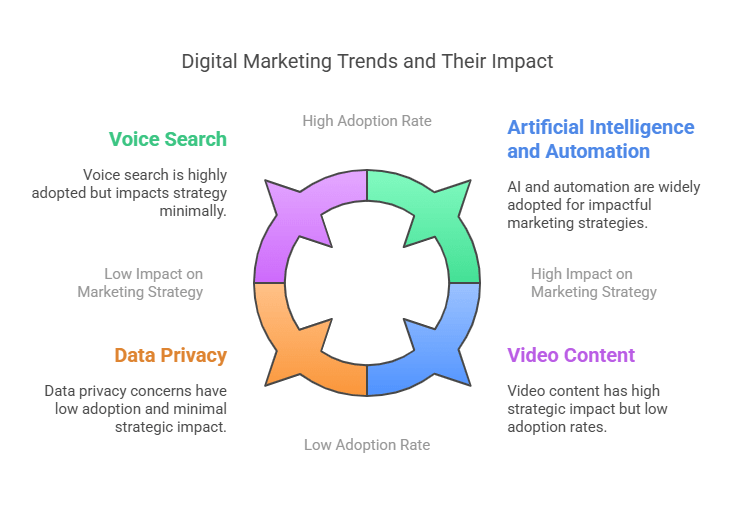
Conclusion
The field of digital marketing is constantly evolving, and businesses must be aware of new developments and strategies. If you know the essential aspects, tools, and techniques, you can develop an effective marketing strategy that will ensure success. Keep testing innovative strategies and adjust to the changing trends in the modern world to stay ahead of the competition.


